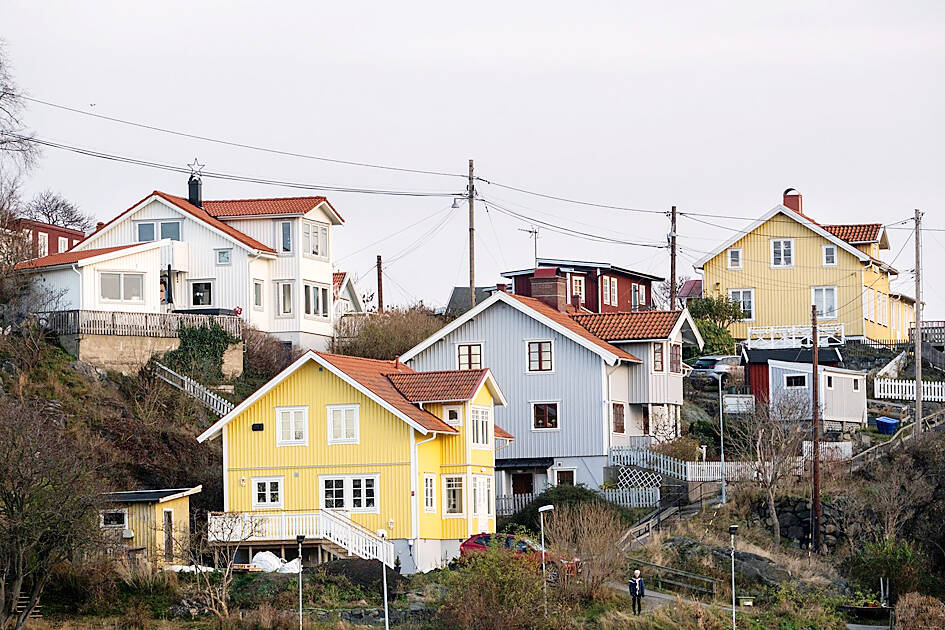The drop for home prices in Sweden continued unabated in the last month of last year, suggesting that this year could offer little relief for an already troubled housing market.
The overall market is down almost 17 percent since a peak in the spring, according to state-owned mortgage lender SBAB Bank AB, indicating that the 20 percent forecasts made by most economists — including the central bank — could prove too conservative.
The Nordic country is far from alone in suffering from falling property values. After booming during the COVID-19 pandemic, central bank interest-rate hikes have triggered a real-estate downturn in a number of nations globally, including in Canada, Australia and New Zealand.

Photo: Bloomberg
The new data sum up a bad year for Swedish home owners and real-estate firms, who are having to adjust to seeing the value of their properties fall in the wake of the surging cost of living and borrowing, and a gloomy economic outlook.
Last month, home prices fell 2 percent from the previous month, adjusted for seasonal variations, SBAB said yesterday, citing an indicator based on transaction data from its real-estate listing site Booli.
That follows a 2.2 percent decline in November and 2.3 percent in October.
“If unemployment were to increase significantly in the wake of the approaching recession, it’s important that mortgage rates do not continue to rise,” SBAB chief economist Robert Boije said in the statement, adding that this could lead to a “very difficult” situation for the housing market, which could also hit the production of new homes.
Prices for detached houses are now down 19 percent from the peak in the spring of last year, while apartment prices have fallen 14 percent.
The larger drop for house prices than apartments is in part explained by high electricity prices, which make it more costly to heat single-family homes.

A wave of stop-loss selling and panic selling hit Taiwan's stock market at its opening today, with the weighted index plunging 2,086 points — a drop of more than 9.7 percent — marking the largest intraday point and percentage loss on record. The index bottomed out at 19,212.02, while futures were locked limit-down, with more than 1,000 stocks hitting their daily drop limit. Three heavyweight stocks — Taiwan Semiconductor Manufacturing Co (TSMC, 台積電), Hon Hai Precision Industry Co (Foxconn, 鴻海精密) and MediaTek (聯發科) — hit their limit-down prices as soon as the market opened, falling to NT$848 (US$25.54), NT$138.5 and NT$1,295 respectively. TSMC's

SELL-OFF: Investors expect tariff-driven volatility as the local boarse reopens today, while analysts say government support and solid fundamentals would steady sentiment Local investors are bracing for a sharp market downturn today as the nation’s financial markets resume trading following a two-day closure for national holidays before the weekend, with sentiment rattled by US President Donald Trump’s sweeping tariff announcement. Trump’s unveiling of new “reciprocal tariffs” on Wednesday triggered a sell-off in global markets, with the FTSE Taiwan Index Futures — a benchmark for Taiwanese equities traded in Singapore — tumbling 9.2 percent over the past two sessions. Meanwhile, the American depositary receipts (ADRs) of Taiwan Semiconductor Manufacturing Co (TSMC, 台積電), the most heavily weighted stock on the TAIEX, plunged 13.8 percent in

In a small town in Paraguay, a showdown is brewing between traditional producers of yerba mate, a bitter herbal tea popular across South America, and miners of a shinier treasure: gold. A rush for the precious metal is pitting mate growers and indigenous groups against the expanding operations of small-scale miners who, until recently, were their neighbors, not nemeses. “They [the miners] have destroyed everything... The canals, springs, swamps,” said Vidal Britez, president of the Yerba Mate Producers’ Association of the town of Paso Yobai, about 210km east of capital Asuncion. “You can see the pollution from the dead fish.

ASML Holding NV, the sole producer of the most advanced machines used in semiconductor manufacturing, said geopolitical tensions are harming innovation a day after US President Donald Trump levied massive tariffs that promise to disrupt trade flows across the entire world. “Our industry has been built basically on the ability of people to work together, to innovate together,” ASML chief executive officer Christophe Fouquet said in a recorded message at a Thursday industry event in the Netherlands. Export controls and increasing geopolitical tensions challenge that collaboration, he said, without specifically addressing the new US tariffs. Tech executives in the EU, which is